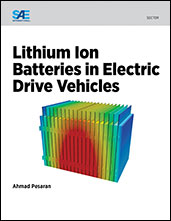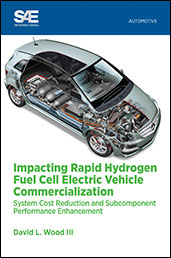Book

Lithium Ion Batteries in Electric Drive Vehicles
2016-05-16
This research focuses on the technical issues that are critical to the adoption of high-energy-producing lithium Ion batteries. In addition to high energy density / high power density, this publication considers performance requirements that are necessary to assure lithium ion technology as the battery format of choice for electrified vehicles. Presentation of prime topics includes: • Long calendar life (greater than 10 years) • Sufficient cycle life • Reliable operation under hot and cold temperatures • Safe performance under extreme conditions • End-of-life recycling To achieve aggressive fuel economy standards, carmakers are developing technologies to reduce fuel consumption, including hybridization and electrification. Cost and affordability factors will be determined by these relevant technical issues which will provide for the successful implementation of lithium ion batteries for application in future generations of electrified vehicles.


